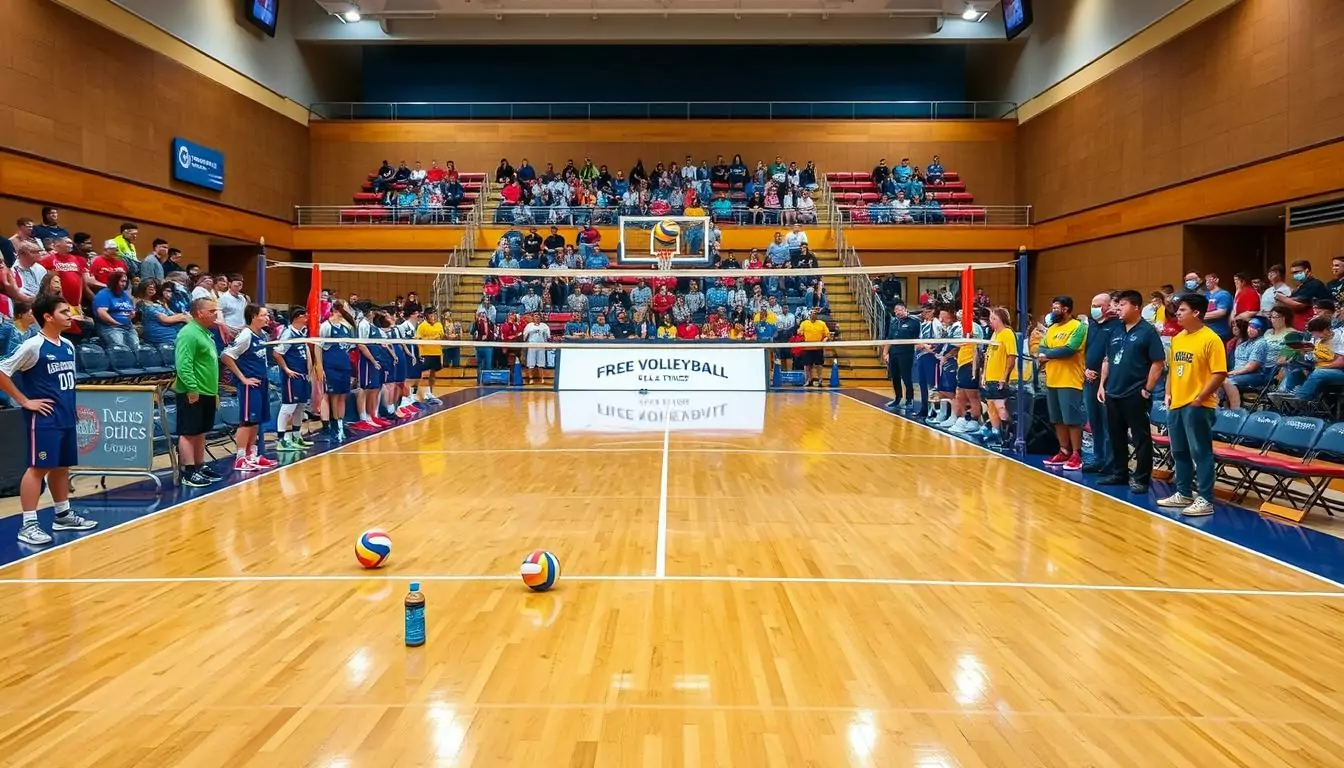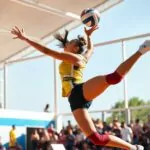Did you know volleyball is played by over 800 million people worldwide? It was created in 1895 by William G. Morgan. Players need great agility, coordination, and teamwork. As a volleyball enthusiast, I’ve worked hard on my pre-match routine.
In this guide, I’ll share my insights and strategies for match day success. I’ll cover essential skills, physical, and mental preparation. My goal is to help you improve your volleyball game.
Key Takeaways
- Volleyball needs quick energy and long-lasting endurance.
- Interval training and long-distance running boost preparation.
- Leg exercises like squats and lunges improve jumping and agility.
- Core exercises, such as planks, enhance stability.
- Dynamic stretching and agility drills prevent injuries and improve flexibility.
Understanding the Importance of Match Preparation

As a volleyball player, I’ve learned that proper preparation is key. It includes physical conditioning, skill development, mental preparation, and planning. This approach has greatly improved my game.
My Personal Experience with Match Day
On match day, I stick to a routine. This includes a focused warm-up, visualization to boost confidence, and a specific playlist. This routine helps me get into athlete mode, allowing me to perform at my best.
Why Preparation Matters in Volleyball
- Volleyball players who visualize before a game have 15% more confidence.
- A pre-game routine reduces anxiety by 20% and boosts comfort by 25%.
- Players with clear goals before a match focus 30% better and achieve more.
- Using mindfulness improves reaction times by 25% during games.
These stats show how mental preparation, a solid game plan, and good communication tactics boost performance. By focusing on these, I’ve improved my game and helped my team succeed.
“Breathe, Believe, Battle.” – Kerri Walsh Jennings, three-time Olympic Gold Medalist
Volleyball requires a well-rounded approach to preparation. By combining physical, mental, and strategic elements, I’ve reached my full performance. This preparation has been key to my growth as a player.
Setting Goals for My Volleyball Performance

As a dedicated volleyball player, I know how vital setting clear goals is. These goals guide my training and help me track my progress. Whether it’s for a single match or my whole career, setting goals is key to getting better.
Specific Goals for Each Match
Before each match, I set specific, measurable goals. For example, I might aim to have 8 out of 10 serves land in the opponent’s court in two months. This focus on serving helps me improve and track my progress.
I spend half an hour, three times a week, on serving drills. This helps me reach my goals. Knowing I’m working towards something specific keeps me motivated.
The Role of Short-term and Long-term Goals
I also have long-term goals, like increasing my vertical jump by 3 inches or hitting 20 kills in a match. These goals require effort over time but push me to grow.
Getting feedback from coaches and players helps me improve. Celebrating small wins keeps me motivated and shows I’m on the right path.
By balancing short-term and long-term goals, I stay focused on the present and work towards my career vision. This approach has driven my success on the court.
Gathering My Gear and Equipment

As a dedicated volleyball player, I know the right gear is key for success. I wear comfortable, moisture-wicking clothes and volleyball shoes that support and grip. Each piece of my gear is vital for my performance.
Essential Volleyball Gear I Never Forget
- Comfortable, breathable clothing that allows for easy movement
- Volleyball shoes with excellent traction and ankle support
- Knee pads to protect my joints during dives and falls
- Ankle braces to prevent sprains and other injuries
- A water bottle to stay hydrated throughout the match
I always check my volleyball equipment before each match. This pre-match checklist ensures my game gear is ready to perform at its best.
How to Check My Equipment Before the Match
- Inspect my volleyball shoes for any signs of wear or damage
- Ensure my knee pads and ankle braces are properly secured and comfortable
- Check that my clothing is free of any rips or stains and fits comfortably
- Make sure my water bottle is filled and easily accessible
- Perform a few practice movements to test the flexibility and support of my gear
Reviewing my volleyball equipment before each match boosts my confidence. It prepares me to give my all on the court.
Mental Preparation for the Match
Being a volleyball player means your mind is as important as your body. Using strategies to stay focused and imagine winning can really help. It boosts your confidence and improves your mental game.
Strategies for Staying Focused
Having a pre-game routine is key to staying focused. It might include breathing exercises, positive affirmations, or listening to music that motivates you. These habits help you get in the right mindset and stay focused during the game.
Mindfulness and meditation are also important. They help you concentrate better and think more clearly. This lets you react quicker to the game’s fast pace.
Visualizing My Success on the Court
Visualization is a powerful tool for me. Before each game, I imagine myself making perfect plays. This boosts my confidence and sharpens my skills.
Watching game footage is another way I prepare. It helps me see what I can improve on and how to do better next time. This makes me feel more ready and in charge during the game.
By using strategies to stay focused and visualizing success, I’m ready to perform my best. I lead my team to victory with a strong mental game.
Physical Fitness and Conditioning

Being fit is key for volleyball players. The game needs strength, power, agility, and endurance. A good conditioning plan is essential.
My Favorite Warm-up Routines
I start with a dynamic warm-up before playing. It includes jogging, high knees, and jumping. These exercises get my muscles ready and improve my flexibility.
Importance of Stretching Before a Match
Stretching before a game is vital. I stretch my hips, shoulders, and lower back. This helps me move better and avoid injuries.
Strength training is also important. I do squats, lunges, and core exercises. These help me hit, block, and dive better. Plyometric drills like box jumps boost my explosive power.
Having a balanced conditioning routine is key. It covers endurance, strength, and flexibility. This helps me perform well and stay injury-free.
Nutrition for Optimal Performance

As a volleyball player, I know how important good nutrition is. Eating the right mix of carbs, proteins, and fats helps me stay energized, build muscle, and recover from tough games.
What I Eat on Match Day
Before a big game, I eat a meal full of complex carbs and lean protein. This might be a whole grain bagel with peanut butter, grilled chicken, and roasted sweet potatoes. It gives me the volleyball nutrition I need to perform well, without feeling heavy.
Hydration Strategies I Swear By
Drinking enough water is key for my game. I drink lots of water all day and use sports drinks like Gatorade to replace lost electrolytes. Staying hydrated keeps my energy up and prevents cramps or fatigue.
By eating well and staying hydrated, I can give my best on the court. These habits are a big part of my pre-game routine. They help me perform at my best in every game.
“Proper nutrition choices before and after games can enhance energy levels, strength, endurance, and reduce the risk of injury in volleyball players.”
Team Strategy Sessions

As a volleyball player, I know how key team strategy is to winning. In team strategy sessions, we plan our game, study our opponents, and decide roles for each player. These talks help us work together better and feel united.
How I Contribute to Team Strategy
In our strategy talks, I share what I’ve noticed about our opponents. I look for chances to use their weaknesses against them. I also suggest plays that could help us win.
I also speak up and listen to others. I think talking openly and listening to different views is key to a good team strategy.
Importance of Communication with Teammates
Good communication is vital for a winning volleyball team. In games, I try to talk clearly and use signals to coordinate with my teammates. We have special signals and words to share important info fast.
This open communication lets us adjust quickly and work together smoothly. It helps us follow our plan and win more games.
| Key Aspects of Effective Team Strategy | Importance |
|---|---|
| Collaborative Discussions | Fosters unity and shared purpose among teammates |
| Identification of Opponent Weaknesses | Allows for the exploitation of vulnerabilities |
| Clear Communication | Facilitates quick adjustments and high-level coordination |
| Defined Roles and Responsibilities | Ensures each player understands their contribution to the team |
By focusing on team strategy and talking well with my teammates, I’m sure we can win. We’ll plan and execute our strategy with precision.
Reviewing Match Footage

As a dedicated volleyball player, I’ve found reviewing match footage key to my game. It helps me spot my strengths and weaknesses. I also learn about my opponents’ strategies.
What I Look for in Previous Matches
When I review game footage, I focus on a few important things:
- Serving patterns and accuracy
- Attacking technique and decision-making
- Defensive positioning and reactions
- Communication and coordination with my teammates
This helps me see where I can get better at my skills.
How Analyzing Footage Helps My Game
Match analysis has greatly improved my game. It helps me see how to get better. Reviewing footage lets me:
- Spot technical flaws I might miss in real-time
- Learn from my decision-making
- Understand the game flow better
- Work with my coach and teammates on strategy
By regularly reviewing footage, I keep improving and reaching new heights.
| Key Insights from Match Footage Analysis | Impact on Performance |
|---|---|
| Identifying technical flaws in mechanics | Improved technique and execution |
| Observing decision-making process | Enhanced decision-making and game sense |
| Understanding game flow and anticipation | Faster reactions and better positioning |
| Collaborating with coach and team | Refined strategies and improved teamwork |
“Reviewing match footage has been a game-changer for my volleyball career. It’s allowed me to pinpoint areas for improvement and make targeted adjustments that have translated to measurable gains on the court.”
The Role of Coaches in Preparation

As a seasoned volleyball player, I’ve learned how important coaches are in my game prep. A strong bond between player and coach is key to success on the court. My coach’s advice and skills have helped me grow physically and mentally, always pushing me to get better.
My Relationship with My Coach
I’m lucky to have a coach who knows the game and me well. We regularly talk and set goals together. This helps me improve and reach my full volleyball ability.
How Coaches Help Me Improve
Coaches are essential in boosting my volleyball skills. They watch my game closely and help me work on my weaknesses. Their help has made a big difference in my performance.
My coach also works on my mental game. They teach me how to stay focused and manage nerves before matches. This approach has helped me reach my volleyball goals.
“Coaches are the unsung heroes of any successful volleyball team. Their ability to identify and nurture talent, while also instilling the discipline and mental toughness required to excel, is truly remarkable.” – Karch Kiraly, Volleyball Legend
Dealing with Pre-Match Anxiety

As a volleyball player, I’ve faced the challenge of pre-match anxiety. The excitement before a big game often mixes with nerves and stress. But, I’ve learned ways to calm my mind and enjoy the adrenaline rush.
Techniques I Use to Calm My Nerves
Deep breathing exercises are a key tool for me. A few minutes of slow, controlled breathing helps me calm down. Positive self-talk also boosts my confidence and fights off negative thoughts.
Visualization is another technique I rely on. Before a game, I mentally rehearse successful plays. I imagine myself making perfect serves and powerful spikes. This mental prep makes me feel ready and in control.
Embracing the Adrenaline Rush
I’ve learned to see the good in pre-match anxiety. I use that nervous energy to focus and perform better on the court. The adrenaline rush can improve my speed and decision-making if I’m well-prepared.
Having a consistent pre-match routine is key for me. It includes listening to music, stretching, and warm-ups. This routine gets me in the right mindset and boosts my confidence.
By using these strategies, I’ve turned pre-match anxiety into a strength. Embracing the excitement and focusing on my game has changed my volleyball career for the better.
“The key is to not let pre-match anxiety control you, but to control it and use it to your advantage.”
Practicing Specific Skills
I’m passionate about volleyball and know that practice is key. I focus on improving my skills during training. This helps me get better on the court.
The Skills I Focus on During Practices
I concentrate on a few key skills in my practice:
- Serving: I aim to make my serves more accurate, powerful, and consistent. This puts pressure on the other team.
- Passing: Good passing is essential for a strong offense. I work on my platform and footwork to pass better.
- Setting: As a setter, I practice placing the ball, timing, and making decisions. This helps our team attack well.
- Hitting: I refine my approach, swing, and ball placement. This makes me a more versatile and powerful hitter.
- Blocking: I focus on blocking to disrupt the opponent’s offense. I work on timing, footwork, and hand positioning.
Setting Up Drills to Enhance My Game
I use various drills to improve my skills. Here are some effective ones:
- Serving Drills: I serve to different zones and try different techniques. I also compete in serving challenges to get better.
- Partner Passing Drills: I practice passing with a teammate. We focus on proper formation and footwork.
- Setting Accuracy Drills: I set to specific targets and practice from different positions. I also set in game-like scenarios.
- Attack Line Hitting Drills: I work on different hitting approaches and shot selections. I aim to improve my power and placement.
- Blocking Drills: I practice blocking techniques and work on timing and footwork. I also do competitive blocking challenges.
These drills help me improve my volleyball skills. They make me perform better on the court.
The Day Before the Match
As a seasoned volleyball player, I know the day before a match is key. I focus on light practice, mental prep, and rest. This ensures I’m ready for the competition.
My Routine for Pre-Match Preparation
I review the game plan and scouting reports with my teammates. We visualize success and discuss strategies. I also check my gear to make sure everything is ready.
In the afternoon, I do light exercises to stay active. This might be yoga or foam rolling. It keeps me limber without exhausting me.
Importance of Rest and Relaxation
Getting enough rest is vital for me. I aim for 8 hours of sleep the night before. This refreshes my body and mind.
In the evenings, I unwind with activities like reading or watching TV. These help manage anxiety and keep my focus positive.
My pre-match routine prepares me physically and mentally. It gives me the edge I need for success on the court.
Arriving at the Venue
As a seasoned volleyball player, I know how key match day prep is. Getting to the venue on time is essential for top performance. I always check my list to make sure I have everything I need.
My Checklists for Match Day
- Volleyball shoes and knee pads
- Water bottle and sports drinks
- Snacks and energy bars
- Uniform and warm-up clothes
- Towel and toiletries
- Phone, charger, and headphones
- Any necessary medication or first aid supplies
Arriving early lets me get to know the court and do my warm-ups. It also helps me mentally prepare for the game. Being early makes me feel more in control and less stressed.
How I Get in the Right Mindset
To get ready, I listen to my pre-game playlist. It’s full of energetic music that gets me pumped. I also imagine myself playing well and leading my team to win. Doing some team bonding helps us stay focused.
By following my checklist, arriving early, and getting mentally ready, I’m set to give my all. This focus helps me perform at my best and support my team.
Building Team Chemistry
Volleyball is all about team chemistry. As a player, I’ve seen how important it is to have strong relationships and a united team. Fun activities and team bonding help us perform better and enjoy the game more.
Fun Activities I Do with My Teammates
We do lots of fun things together, like team dinners and group workouts. These activities help us bond and improve our fitness. We also play volleyball games to show off our skills in a fun way.
The Importance of Team Bonding
- Improved on-court communication and trust: Spending time together off the court helps us understand each other better. This makes us work better as a team during matches.
- Enhanced overall team performance: Studies show that united teams do better under pressure. By building a positive team culture, we can use our strengths to overcome challenges.
- Stronger player relationships: Regular team-building exercises help us connect on a personal level. They help us solve any issues and build a strong sense of camaraderie.
Investing in team chemistry is more than just winning. It’s about creating a place where we can grow together. By focusing on activities that bring us closer, we improve our skills and strengthen our bonds on the court.
Reflecting on the Match
After the final whistle, the real work starts. As a dedicated volleyball player, I know that reflecting on my game is key. I analyze the match data and talk about my strengths and weaknesses with my coaches and teammates. This helps me learn and get better for the next game.
How I Analyze My Performance After
Right after the game, I look at important stats like serving, passing, and attacking. These numbers show how my actions affect the team’s success. I also watch game footage to find patterns and areas to improve.
Lessons Learned for Future Matches
Post-match analysis is not just about fixing mistakes. It’s also about finding what I do well and getting better at it. Sharing my insights with the team helps me understand the game better. I can then use these lessons to improve my skills and teamwork for the next game.





